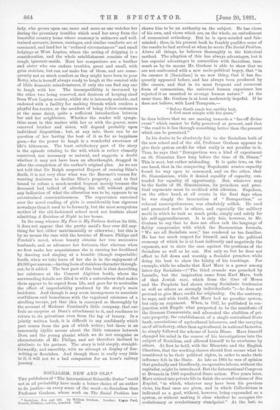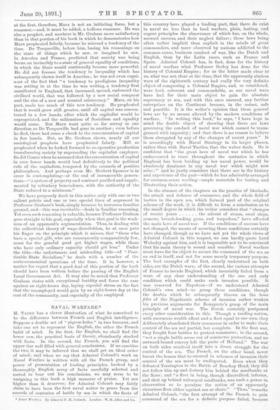SOCIALISM, NEW AND OLD.*
-THE publishers of "The International Scientific Series" could not in all probability have made a better choice of an author to do justice—in every sense of the word—to Socialism than Professor Graham, whose work on The Social Problem, has Socialism, Now and OUT. By William Graham. London : Kogan Paul, Trench, Trabnar, and Co., Limited, 1890, shown him to be an authority on the subject. He has views of his own, and views which are, on the whole, an embodiment of economical orthodoxy. But he is open-minded and fair- minded ; thus, in his present book he frankly qualifies some of the results he had arrived at when he wrote The Social Problem, Above all things, be believes thoroughly in the historical method. The adoption of this has always advantages, but it has especial advantages in connection with Socialism, inas- much as by its means Mr. Graham is able to show that we are not confronted with a new socio-political bogey, that "in its essence it [Socialism] is no new thing, that it has fre- quently appeared before, and has always been produced by like causes, and that in its most frequent and recurrent form of communism, the universal human experience has rejected it as unsuited to average human nature." At the same time, Mr. Graham is at least moderately hopeful. If he does not believe, with Lord Tennyson,—
"Before Earth reach her earthly best, A God must mingle with the game,"
he does believe that we are moving towards a "far-off divine event" which cannot be fully perceived at present, and that "the road to it lies through something better than the present which can be perceived."
In his desire to be absolutely fair to the Socialists both of the new school and of the old, Professor Graham appears to give their system credit for what really is not peculiar to it. Thus, he says that "Bonapartism was a kind of experiment on St. Simonian lines long before the time of St. Simon." This is neat, but rather misleading. It is quite true, on the one hand, that in the conquering Napoleenic armies capacity found its way open to command, and on the other, that St. Simonianism, while it denied equality of capacity, con- tended for equality of opportunity. But, whatever may be the faults of Sb. Simonia.nism, its preachers and prac- tical exponents must be credited with altruism. Napoleon, on the other band, at all events in the final days when he was simply the incarnation of " Bonapartism," or colossal unscrupulousness, was absolutely selfish. He used and promoted merit in others, and especially the military merit in which he took so much pride, simply and solely for his self-aggrandisement. It is only fair, however, to Mr. Graham to say that he does not often talk the language of flabby compromise with which the Harcourtian formula, "We are all Socialists now," has rendered us too familiar. He has too much respect for himself, and for the political economy of which he is at least indirectly and negatively the exponent, not to state the case against the positions of the Socialists as well as he can. Not only so, but he does not affect to fall down and worship a Socialist preacher, while doing his best to show the falsity of his teachings. For example, while he admits that Karl Marx is a power among latter-day Socialists—(" The third crusade was preached by Lassalle, but the inspiration came from Karl Marx, both of that Jewish race, which from the time of Moses and the Prophets had shown strong Socialistic tendencies as well as others as strongly individualistic ")—he does not pretend to give Marx credit for originality. On the contrary, he says, and with truth, that Marx had no peculiar system, but only an argument. When, in 1847, he published in con- junction with Engels what purported to be the manifesto of the German Communists, and advocated the abolition of pri- vate property, the establishment of a single centralised State bank, associations of agricultural labourers, and the carrying on of all industry, other than agricultural, in national factories, he simply followed the scheme of Louis Blanc. Marx himself changed his mind in the course of his investigations into the subject of Socialism, and allowed himself to be overborne by others. At first he held, with the Blancists and the English Chartists, that the working classes should first secure what he considered to be their political rights, in order to make their influence felt in the State. As late as 1864 he was of opinion that gradually and bloodlessly, co-operative labour, without the capitalist, might be introduced. But the International Congress at Brussels in 1868 repudiated State action. Five years later, Marx retired into private life to finish the second volume of Das Kapital, "in which, whatever may have been his previous views, his final ones are given, and in which Collectivism is indicated as a goal, without, however, being expounded as a system, or without making it clear whether he occupies the evolutionary or revolutionary standpoint." At the last, as at the first, therefore, Marx is not an initiating force, but a reasoner,—and, it must be added, a tedious reasoner. He was also a prophet, and nowhere is Mr. Graham more satisfactory than in that portion of his book in which he demonstrates how Marx prophesied falsely, because he misread a tendency of the time. De Tocqueville, before him, basing his reasonings on -the state of things which he saw, or imagined he saw, in America and France, predicted that society was being borne on invincibly to a state of general equality of conditions, in which the State would continually become more powerful, He did not foresee the tendency to inequality which has subsequently shown itself in America; he was not even cogni- sant of the fact that "a tendency to prodigious inequality was setting in at the time he was writing, a tendency first manifested in England, that increased, spread, embraced the civilised world, that was followed by a new social conquest and the rise of a new and monied aristocracy." Marx, on his part, made too much of this new tendency. He prophesied that it would grow still greater, until all capital was concen- trated in a few hands, after which the capitalist would be expropriated, and the millennium of Socialism and equality would come, But Marx went quite as far astray in one direction as De Tocqueville had gone in another ; even before he died, there had come a check to the concentration of capital in few hands. But, as Mr. Graham shows, nearly all our sociological prophets have prophesied falsely. Mill so prophesied when he looked forward to co-operative production -transforming society by superseding the capitalist employer. So did Comte when he assumed that the concentration of capital in ever fewer hands would lead definitively to the political rule of the capitalists, tempered by the counsels of positive philosophers. And perhaps even Mr. Herbert Spencer is in error in contemplating—at the end of innumerable genera- tions—" a system of property and contract purified and supple- mented by voluntary benevolence, with the authority of the State reduced to a minimum."
We have purposely dealt in this notice only with one or two salient points and one or two special lines of argument in Professor Graham's book, simply because he traverses familiar ground, and—this was inevitable—deals in familiar reasoning. Yet even such reasoning is valuable, because Professor Graham goes straight to his goal, especially when that goal is the weak- ness of an opponent's argumentation. Thus, in dealing with the collectivist theory of wage-distribiition, he at once puts his finger on the principle which it misses, that 'those who have a special gift, who are consequently comparatively few, must for the general good get higher wages, while those who have only ordinary capacity should get less," Under the title—the unfortunate and misleading title—of "Prac- ticable State Socialism," he deals with a number of the socio-economical questions of the time. It is, however, a matter for regret that a good deal of this portion of the book should have been written before the passing of the English Local Government Act. It may also be noted that Professor Graham states with exceptional lucidity and force the case against an eight-hours day, laying especial stress on the fact that the unemployed would gain by an eight-hours day at the cost of the community, and especially of the employed.



































 Previous page
Previous page